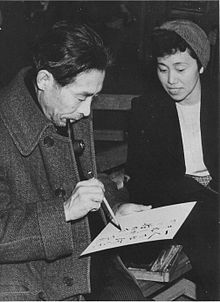Kishida Kunio

Kishida Kunio ( Japanese 岸 田 國 士 ; born November 2, 1890 in Tokyo ; † March 5, 1954 ) was a Japanese writer, literary critic, translator and playwright and as such a pioneer of Western European drama in Japan. His older sister is also a writer and the wife of translator Ken Nobuhara . His eldest daughter, Kishida Eriko, is a children's author and poet, and his younger daughter is the actress Kishida Kyōko .
Life
He was born as the eldest son of the soldier Kishida Shōzō from Wakayama Prefecture in Tokyo. He attended the military academy and was assigned to the 48th Infantry Regiment in Kurume as a lieutenant in the army. His interest in literature led Kishida to leave the army at the age of 28, to be disinherited by his father and to study French literature and modern drama at the University of Tokyo . In 1919 he traveled to France via French Indochina , studied with Jacques Copeau from 1921-22 and went in and out of the Théâtre du Vieux-Colombier. After returning to Japan in 1923, one year after his father died, he published a number of dramas, including Altes Spielzeug ( 古 い 玩具 , Furui omocha; 1924), Herbst in Tirol ( チ ロ ル の 秋 , Chiroru no Aki; 1924), Paper airship ( 紙 風 船 , Kami Fūsen; 1925), Ochiba Nikki ( 落葉 日記 , autumn foliage diary; 1927), year and day ( 歳 月 ; Saigetsu; 1939) and the most important chestnut tree in the village ( 村 の 一番 の 栗 の木 , Mura no ichiban no kuri no ki; 1941). He also translated various works by Jules Renard into Japanese.
In 1932 he taught literature at the newly founded Meiji University in Tokyo. In 1935 he wrote his most important piece, The Two Daughters of the Sawa Family ( 沢 氏 の 二人 娘 , Sawa-shi no futari musume). In 1937 he founded the theater group Bungaku-za ( 文学 座 ) with Shishi Bunroku and Kubota Mantarō . In the book Jūgun gojūnichi , he reflected on two trips (1937 on behalf of the literary magazine Bungei Shunjū and 1938 on behalf of the government) to the scenes of the Sino-Japanese War .
Kishida suffered a stroke in 1954 during a rehearsal for a production of the Maxim Gorki play Nachtasyl ( ど ん 底 , Donzoko), from which he died in hospital a day later. The Kishida Kunio gikyokushō , one of the most renowned theater awards in Japan, was named after him.
literature
- J. Thomas Rimer: "Paris in Nanjing: Kishida Kunio Follows the Troops" in: Marlene J. Mayo, J. Thomas Rimer, H. Eleanor Kerkham: "War, occupation, and creativity: Japan and East Asia, 1920-1960" , University of Hawaii Press, 2001, ISBN 9780824824334 , pp. 176-187
- John Scott Miller: "Historical dictionary of modern Japanese literature and theater" , Scarecrow Press, 2009, ISBN 9780810858107 , p. 53
- Louis Frédéric : Japan Encyclopedia . Harvard University Press, 2002, ISBN 0-674-00770-0 , pp. 528 (English, limited preview in the Google book search - French: Japon, dictionnaire et civilization . Translated by Käthe Roth).
- Phillip Zarilli, Bruce McConachie, Gary Jay Williams, Carol Fisher Carefree: "Theater histories: an introduction" , 2nd edition Taylor & Francis, 2010, ISBN 9780415462235 , p. 406
Web links
- Works by Kishida at Aozora Bunko (Japanese)
- Kishida Kunio in the database of Find a Grave (English)
Individual evidence
| personal data | |
|---|---|
| SURNAME | Kishida, Kunio |
| ALTERNATIVE NAMES | 岸 田國士 (Japanese) |
| BRIEF DESCRIPTION | Japanese playwright |
| DATE OF BIRTH | November 2, 1890 |
| PLACE OF BIRTH | Tokyo |
| DATE OF DEATH | March 5, 1954 |
